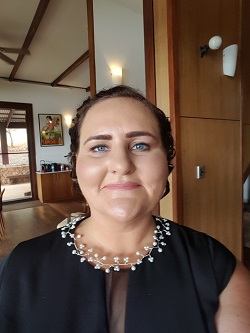“I was unhappy – constantly monitored, and always being pushed to do more.”

What work were you doing previously?
I'd always worked for private companies in team lead, coordinating, and planning roles.
What are you doing now?
I'll soon be celebrating my two-year anniversary working for a charitable organisation called Sova.
Our team specialises in working with people with offending backgrounds, helping them get back into education, training and employment. These individuals have multiple complex issues which we assist in overcoming or improving.
I also volunteer for Sova as an Independent Visitor to children in the care system, and I've trained to become a volunteer panel member for the local Youth Offending Team.
Why did you change?
I was unhappy working in an environment where I was constantly monitored by KPIs and targets, always being pushed to do more.
With the growth of the organisation came more work, more responsibility, and yet more cutbacks on staff. There was never an offer of an increase in salary, or even just a pat on the back to say "Well done, you're doing really well."
When was the moment you decided to make the change?
When it was decided that the job role I'd been in for just under two years was no longer required, I was offered either an alternative position in the organisation or redundancy.
I left the job without looking back.
I'd never liked it, it just kept the roof over my head.
Are you happy with the change?
I'm more than happy.
Don't get me wrong, I meet and work with some very complex individuals, but from my own personal experiences and the training I have received through Sova, I feel I could pretty much handle anything that comes my way.
I've learnt a lot about myself and all the different people in society I get the opportunity to work with. I've also completed a college course, purely from my own desire to become better at what I do.
What do you miss and what don't you miss?
There's nothing I actually miss.
I don't miss working in a bitchy office environment, the commute to and from the office, or doing the same mundane tasks on a daily basis.
How did you go about making the shift?
After leaving my job I was unemployed for seven months.
Unable to survive on Jobseeker's Allowance alone, my parents supported me financially so I didn't lose my own home and independence, which I'd worked so hard for since the age of 22.
I was applying for roles similar to the ones I'd always done – team lead, coordinating, planning – while also feeling like blowing my brains out. I knew in my heart it wasn't what I wanted to do, but I had to find a way to pay the bills.
When I first started claiming JSA I had to attend 'Job Club' for four weeks (if you don't attend, you don't get your benefits). This 'club' was a classroom environment where work coaches would show you how to write a CV, how to conduct yourself in an interview, etc.
It was great for the people that needed that help; however, I'd come from working in an international company recruiting specialist inspectors in the oil and gas industry, creating their profiles and making them sound absolutely worth the thousands of pounds we charged our clients for them. To me, this was a complete slap in the face. It was more than likely that I knew more about this subject than all of the work coaches put together.
But for a short period I had a great coach, who saw me for who I was and gave me a lot of her time. Unfortunately this was short lived as she was changing job role, but it was this lady that helped me find a voluntary role to help keep my mind active.
I ended up volunteering for a charity that helps with supported housing for people who've just come out of prison. The charity saw potential in me after a couple of months; even though it was voluntary, they asked me to manage their highest risk property, which I felt happy to do.
Not long into this work I thought, "I'm good at this. Perhaps it's something I could get paid to do."
What didn't go well? What wrong turns did you take?
My interview with Sova didn't go well at all!
Even though I did my homework on the organisation, when it came to the interview questions, quite frankly I screwed them up.
It wasn't until the end of the interview, when they asked if I had any questions or anything to add, that I was able to 'sell' myself as a good, non-judgmental person, who just wanted to help. At this point, the Project Manager (whom I now work under) looked at all my details and gave me some positive feedback.
How did you handle your finances to make your shift possible?
As I've mentioned, my parents supported me while I was unemployed, and I claimed Jobseeker's Allowance.
There was obviously a changeover period when I went from the Jobseeker's Allowance to receiving work pay, and then I had to learn how to claim work expenses.
My new pay was actually better than I used to get in the old job.
What was the most difficult thing about changing?
Being unemployed for seven months challenged me on a daily basis; however, I kept my spirits high that something better was on the horizon.
Other than that? Honestly, nothing.
I had a great management team to report to, and felt completely supported at every step.
I also felt a sense of freedom for the first time ever, managing my own caseload and being trusted like an adult to do what I needed to do.
What help did you get?
 I received great on-the-job training and got to shadow an intervention worker until I felt comfortable to go it alone.
I received great on-the-job training and got to shadow an intervention worker until I felt comfortable to go it alone.
What resources would you recommend to others?
I came across an organisation called Charity Jobs and looked at their website daily.
What have you learnt in the process?
It's possible to take a completely different work direction, even in your mid-30s.
I've also learned that I've wanted to further my education, without someone telling me I have to!
What would you advise others to do in the same situation?
Take the plunge.
You'll constantly question whether you're doing the right thing, but if you prove yourself you'll gain confidence on a daily basis.
Thank you to Charity Job for this story. To find out more about shifting into charity work, visit www.charityjob.co.uk.
What lessons could you take from Lucy's story to use in your own career change? Let us know in the comments below.



